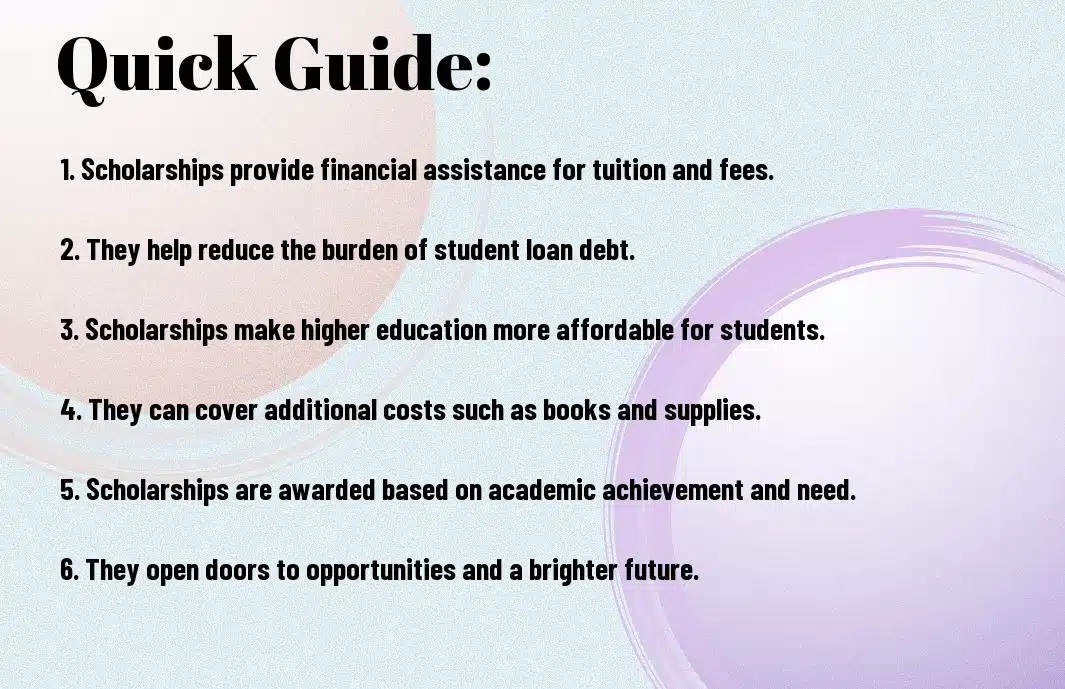Over the years, scholarships have played a crucial role in making higher education accessible to students from all walks of life. These financial aid opportunities not only alleviate the burden of tuition costs but also empower individuals to pursue their academic and career goals. Scholarships can break down financial barriers that often hinder access to higher education, enabling students to focus on their studies without the stress of overwhelming debt. To learn more about how scholarships can help you achieve your career goals, check out How a Scholarship Can Help You Achieve Your Career Goals.
Key Takeaways:
- Scholarships play a crucial role in making higher education accessible: Scholarships provide financial assistance to students in need, making it possible for them to pursue their educational goals without being burdened by the high costs of tuition.
- They help overcome financial barriers: By awarding scholarships based on merit, need, or specific criteria, institutions and organizations can help students overcome financial barriers that may otherwise prevent them from accessing higher education.
- Scholarships promote diversity and inclusivity: By offering scholarships to students from diverse backgrounds, educational institutions can foster a more inclusive environment and ensure that talented individuals, regardless of their financial status, have the opportunity to excel in their academic pursuits.

Understanding Scholarships
You are interested in pursuing higher education, but perhaps the cost seems daunting. Scholarships can be the key to unlocking these opportunities by providing financial aid that doesn’t need to be repaid. Understanding scholarships is crucial in accessing these resources efficiently.
Types of Scholarships and How They Differ
There’s a variety of scholarships available, each with its own criteria and requirements. Merit-based scholarships are awarded based on academic, athletic, artistic, or other abilities. Need-based scholarships are awarded to students who demonstrate financial need. Unique scholarships may be based on factors such as ethnicity, field of study, or community service. Scholarships for specific groups target individuals like minorities, women, or LGBTQ+ students. Career-specific scholarships are tailored to certain professions or industries. After comprehending these differences, you can identify which scholarships align with your strengths and aspirations.
| Merit-based scholarships | Are awarded based on academic, athletic, artistic, or other abilities. |
| Need-based scholarships | Are awarded to students who demonstrate financial need. |
| Unique scholarships | May be based on factors such as ethnicity, field of study, or community service. |
| Scholarships for specific groups | Target individuals like minorities, women, or LGBTQ+ students. |
| Career-specific scholarships | Are tailored to certain professions or industries. |
Factors That Affect Scholarship Awards
One must consider several factors that impact scholarship awards. Academic performance, financial need, extracurricular activities, personal essays, and letters of recommendation all play a role in the selection process. The stronger your profile in these areas, the better your chances of receiving a scholarship. The competition for scholarships can be fierce, so it’s crucial to present yourself in the best possible light.
- Academic performance
- Financial need
- Extracurricular activities
- Personal essays
- Letters of recommendation
The Application Process
Once again, scholarships play a crucial role in making higher education accessible to students from all walks of life. The application process is a critical step in securing financial aid for pursuing academic goals. It is crucial for students to understand the intricacies of applying for scholarships to increase their chances of success.
Step-by-Step Guide for Scholarship Applications
| Research | Start Early |
| Look for scholarships that match your profile | Give yourself enough time to gather all required documents |
If you want to secure scholarships for your higher education, the first step is to conduct thorough research. Look for scholarships that align with your academic achievements, background, and career goals. Additionally, starting the application process early will give you ample time to gather all the necessary documents and craft a compelling application.
Tips for Crafting a Winning Scholarship Application
- Showcase your achievements and unique qualities
- Personalize your application for each scholarship
- Highlight your financial need, if applicable
Clearly, crafting a winning scholarship application requires attention to detail and a personalized approach. It is crucial to showcase your academic achievements, extracurricular activities, and any unique qualities that set you apart from other applicants. Personalizing your application for each scholarship demonstrates your genuine interest and commitment to the opportunity. Additionally, highlighting any financial need you may have can strengthen your case for receiving the scholarship.
Step-by-Step Guide for Scholarship Applications
- Submit all required documents
- Proofread your application thoroughly
- Follow all guidelines and deadlines
Step-by-step, the scholarship application process requires attention to detail and adherence to guidelines and deadlines. Make sure to submit all required documents accurately and on time. Before submitting your application, thoroughly proofread it for any errors or inconsistencies. Following all guidelines provided by the scholarship committee is crucial to ensure your application is considered for the award. Recognizing the importance of each step in the application process can significantly increase your chances of securing the scholarship you need for pursuing higher education.
The Impact of Scholarships
Pros of Scholarships in Education Accessibility
After exploring the impact of scholarships on higher education accessibility, it is evident that scholarships play a crucial role in leveling the playing field for students from diverse socio-economic backgrounds. Financial aid through scholarships can remove the financial barriers that often hinder students from pursuing higher education. This support not only enables students to afford tuition fees but also covers additional costs such as books, accommodation, and transportation, making the overall educational experience more accessible for all.
Cons and Potential Limitations of Scholarships
An important consideration when discussing scholarships in higher education accessibility is the potential limitations and drawbacks associated with these financial aids. While scholarships can significantly alleviate the financial burden on students, limited availability and stiff competition can make it challenging for all deserving individuals to receive support. Additionally, some scholarships may come with rigid eligibility criteria, excluding certain groups of students from accessing this crucial financial assistance.
Impact: Despite the limitations and competition surrounding scholarships, their positive impact on higher education accessibility cannot be overlooked. Scholarships continue to serve as a vital tool in making education more inclusive and accessible, empowering students to pursue their academic aspirations regardless of their financial circumstances.
Maintaining Scholarships and Academic Success
Factors For Keeping Your Scholarship
For many students, maintaining a scholarship goes beyond just receiving the initial award. It requires dedication and adherence to certain guidelines to ensure academic success throughout the program. Some crucial factors for keeping your scholarship include
- Regular Attendance in classes and lectures,
- Meeting the Minimum GPA requirements set by the institution,
and Participating in extracurricular activities or community service. Recognizing the importance of these factors can help students retain their scholarships and continue their education without financial strain.
Strategies for Academic and Personal Growth
One of the most effective ways to ensure academic and personal growth while maintaining a scholarship is by setting realistic goals and creating a study schedule. By prioritizing time management and seeking mentorship from professors or academic advisors, students can navigate challenges more efficiently. The drive and determination to succeed academically will not only help in scholarship retention but also in building a foundation for future career success.
Also Read : The Ultimate Guide To Applying For Scholarships For Your Ph.D. Program
Summing up
Considering all points discussed, scholarships play a crucial role in making higher education accessible to a wider range of students. By providing financial assistance to those in need, scholarships help reduce the barriers to entry into higher education that many individuals face. Not only do scholarships open doors and opportunities for students, they also contribute to creating a more diverse and inclusive academic environment. It is imperative for educational institutions, organizations, and governments to continue investing in scholarships to ensure that students have equal access to quality education regardless of their financial background.
FAQs
Q: Why are scholarships important in making higher education accessible?
A: Scholarships play a crucial role in making higher education accessible by providing financial assistance to deserving students who may not have the means to afford college tuition. They help reduce the financial burden on students and their families, making higher education more attainable for individuals from diverse socio-economic backgrounds.
Q: How do scholarships help increase diversity in higher education institutions?
A: Scholarships help increase diversity in higher education institutions by attracting students from various cultural, ethnic, and socio-economic backgrounds. By providing financial support to students who might not otherwise have the opportunity to pursue a college education, scholarships contribute to creating a more inclusive and diverse learning environment on college campuses.
Q: What impact do scholarships have on academic achievement and student success?
A: Scholarships have a significant impact on academic achievement and student success by reducing financial barriers that may hinder students from focusing on their studies. When students are relieved of the financial stress associated with tuition fees and related expenses, they can fully immerse themselves in their academic pursuits, leading to improved performance, higher graduation rates, and greater overall success in their higher education journey.






